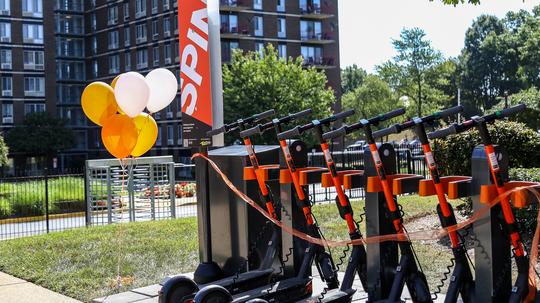
Just when you thought the dockless e-scooter and vehicle battle in Atlanta couldn't get any more convoluted, autonomous scooters and state regulation are now in the mix.
A few weeks following the announcement of Atlanta Mayor Keisha Lance Bottoms' $5 million-plus plan to make safer streets for scooters, e-bikes and other vehicles, witnesses appeared in front of Georgia lawmakers on Tuesday to discuss the difficulty of imposing statewide regulations on electric scooters, the Atlanta Business Chronicle reports.
Experts have cited evolving technology and the difference in laws among Georgia municipalities as to why regulation has been so difficult.
"The state has a role to play for uniformity statewide," Clint Mueller, legislative director for the Association County Commissioners of Georgia, said to members of a state Senate study committee working to create legislation governing e-scooters for consideration later this session. "But locals want to be able to tailor for their situations locally."
To date, 15 cities have passed ordinances to regulate e-scooters and other dockless vehicles since they came to the state in 2018. At least 12 of those municipalities have announced a temporary moratorium on the e-scooters or banned them outright. No Georgia counties have made moves to regulate e-scooters. Some of the primary concerns about the e-scooters are safety, blocking access and oversaturation.
Witnesses pushed for Georgia legislators to work with the e-scooter companies to come up with regulations that are flexible yet put the public's safety first.
As the state General Assembly continues conversations about regulations, a startup in Peachtree Corners is working on an innovative way to solve e-scooters overcrowding and blockage problems.
Tortoise is a Mountain View, Calif.-based startup working with scooter companies to autonomously move their vehicles across a city and reposition themselves without the need of a physical rider, the Verge reports. Basically, Tortoise is working to autonomously park and reorganize scooters after they are used in an effort to decrease clutter and spread them out to areas that need them the most. Using a combination of autonomous software and a team of remote tele-operators to move the scooters, Tortoise plans to help scooter companies and cities solve some of their biggest problems.
The company is reportedly working with scooter manufacturers Acton, TronX Motors, Veemo, and Yimi and shared fleet operators Wind, CityBee, Go X and Shared. To start, Tortoise will focus on tele-operating the scooters and then increase the use of autonomy. Co-founder, CEO and former Uber executive Dmitry Shevelenko told the Verge the company will never be fully autonomous, and the scooters will still rely on remote control operation. The startup is testing its technology at the Atlanta Tech Park, after striking a deal with the city of Peachtree Corners---a local community home to an autonomous vehicle track.








